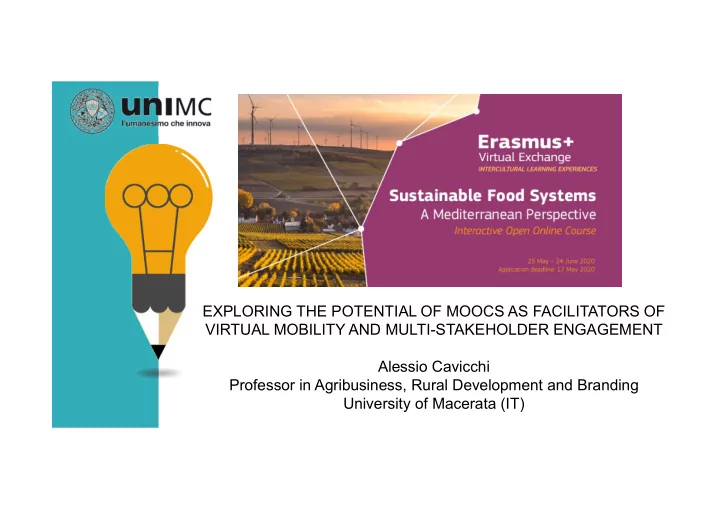

EXPLORING THE POTENTIAL OF MOOCS AS FACILITATORS OF VIRTUAL MOBILITY AND MULTI-STAKEHOLDER ENGAGEMENT Alessio Cavicchi Professor in Agribusiness, Rural Development and Branding University of Macerata (IT)
Multi-stakeholder actions and wicked problems in rural settings Multi-stakeholder actions are processes “in which actors from civil society, business and governmental institutions come together in order to find a common approach to an issue that affects them all” (Roloff, 2008). Wicked problems” refer to issues which are highly complex , have innumerable and undefined causes , and are difficult to understand and frame . there is broad disagreement on what ‘the problem’ is the search for solutions is open ended Imply a wise stakeholders’ management The problem solving process is complex because constraints, such as resources and political ramifications, are constantly changing (Roberts, 2000) Thus, wicked problems cannot be resolved through finding “right answers” or “solutions”, but rather, they must be managed . Hall and Sharples, 2003 What I learned about research strategies and authorship David Zilberman, professor, agriculture and resource economics Papers start with inspiration, the process that stimulates you to do something creative. I believe that economists may be inspired by reality (desire to answer a specific problem or general puzzle that th ey encounter), literature, and data. I tend to be inspired by reality.
Theoretical framework In the Civic University paradigm “teaching has a strong community involvement with the long-term objective of widening participation in higher education and producing well rounded citizens as graduates” (Goddard & Kempton, 2016: 13) THE CIVIC UNIVERSITY It integrates teaching, research and engagement with the outside world: each element enhances the other. (Goddard & Kempton, 2016). It can play a transformative role in terms of change in the organisation of a social function to be collectively coordinated by new institutions able to change social power relations (Benneworth & Cunha, 2015).
Theoretical framework (2) The University plays a pivotal role in innovation for society, by becoming a means of cross-fertilisation and co-creation in different thematic areas and for different actors (Rinaldi et al ., 2018). It can support the achievement of sustainable development in the knowledge economy by contributing to the rise of the trans- disciplinary, practice-based knowledge generation. (Arbo & Benneworth, 2007). SMART SPECIALIZATION STRATEGY (S3)
Theoretical framework (3) Co-creation for sustainability (4 th mission) Concrete solutions for sustainability need to be co-created by multiple actors, such as universities, local government, communities, economic actors and civil society (Trencher et al ., 2014). Transformative university: “a multi-stakeholder platform engaged with society in a continual and mutual process of creation and transformation”. (Trencher et al ., 2014, pp. 7-8). THE QUADRUPLE HELIX and UNIVERSITIES’ 4 th MISSION
Theoretical framework (4) ACTION RESEARCH (Gilmore & Carson, 1996) examines the relationships among academics, professionals and stakeholders (Grant et al., 2001) and draws upon the experience of the researcher for insights useful for st udying entrepreneurial and managerial behaviours through a proper mix of techniques. MUTUALITY Create relationships and ensure reciprocal flows of communication; COMMITMENT Personal involvement and closeness of the research design to the phenomenon observed (Cavicchi et al. , 2014) EXPERIENTIAL LEARNING (Kolb, 1984) ACTION RESEARCH and EXPERIENTIAL LEARNING
Structured working methods advantages & added value PROJECT BASED LEARNING PROBLEM BASED LEARNING CONSULTANCIES & RESEARCH PROJECTS JOINT EVENTS & TOURISM PRODUCTS As university, we teach – more than what we teach… how we teach? Can this be advantageous to the community overall?
WWW.UNIMC.IT/FARMINC
WWW.THEWINELAB.EU
WWW.FOODBIZ.INFO
GLOBAL E-LEARNING PLATFORMS
ADVERTISING SPACE! https://europa.eu/youth/erasmusvirtual/activity/sustainable-food-systems-mediterranean-perspective_en
Erasmus+ Virtual Exchange in a Nutshell ● An innovative way for young people to engage in intercultural experiences online ● Expanding the reach and scope of the Erasmus+ programme ● Goal to foster mutual understanding and skills development ● Target of 25,000 youth in 2018-2020 ● Implemented by a consortium 13
Rationale for initiative Politics Education Paris Declaration Erasmus + Erasmus+ European Neighbourhood Internationalisation Virtual Exchange Policy Digitalisation Media literacy against fake news 14
What is Virtual Exchange? People-to-people real time dialogue Interactions are facilitated to ensure t hey are meaningful A virtual exchange is a sustained desi gned pedagogical process It is technology-enabled 15
16
Target audiences Exchange activities are open to any young person aged 18-30 residing in Erasmus+ p rogramme countries and the Southern Med iterranean The project also targets ● Higher education professors ● University managers/administrators ● Educators ● Youth workers 17
Feedback from the first edition (summer 2019) ● The best thing in Virtual Exchange is that you meet different people from different countries, discuss ab out different topics , try to listen and understand the different point of view. I like the communication, tol erance and collaboration ● I believe the best thing was to be able to share opinions of people from different backgrounds, bringing up different problems and solutions ● "Firstly, I really liked the fact that we had to do some homework before we had the conference call. It re ally helped to have a ""schedule"" and consistency in each week of the course. Secondly, it really broa dened my mind to look at things more globally, and to just break the walls and borders between countri es. Because we have only one planet to all of us and we have to live there and also other generations will have to live here. " ● Knowing people from different countries; the topics and the people I met; different cultures ● Best thing was to meet new people and hear about their cultures. To learn a lot of new about how to de velop sustainable food systems, to hear about different cultures and habits and to make new contacts and get to know people from different countries.
COVID-19 Emergency: new initiatives
Thank you! alessio.cavicchi@unimc.it
Recommend
More recommend